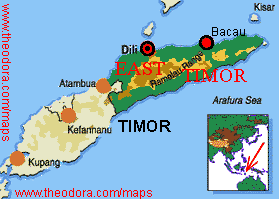Crisis in East Timor
Author and Page information
- This page: https://www.globalissues.org/article/92/crisis-in-east-timor.
- To print all information (e.g. expanded side notes, shows alternative links), use the print version:
East Timor was ruled by Portugal for about 3 centuries. During World War II, thousands of East Timorese lost their lives helping Australia forces fight against the Japanese. East Timor was then invaded by Indonesia shortly after Portugal abruptly left, in 1975. This was the day after U.S. President Ford's visit to Indonesia, with what people have suspected as being a "green light" to invade. At that time, Indonesia had military, economic and political support from countries such as UK, USA and Australia, for various reasons including the oil and gas reserves, a strategic location, various trade and cheap labor related interests. 200,000 people are said to have been killed since 1975 -- one third of the entire East Timorese population. Meanwhile human rights abuses continued.
[December 12, 2001 Update: Recently declassified documents from the U.S. and available at by the George Washington University's National Security Archive project web site confirm that "[Former U.S. President Gerald] Ford and [former Secratary of State Henry] Kissinger Gave Green Light to Indonesia's Invasion of East Timor, 1975"]

What Happened in East Timor?
- August 1999 saw a vote on self determination in East Timor.
- Leading up to this and after the vote where there was an overwhelming majority who voted for independence, Indonesian military-backed militia and paramilitaries went on a terror campaign with slow international reaction.
- Much of East Timor was destroyed and at some points there were estimates from 200,000 to 300,000 refugees created with up to 600,000 people displaced.
- East Timor is now an independent nation, officially. It is also in the process of rebuilding and recovering from the violence it has suffered.
- Reports of other areas of Indonesia suffering similar rights violations are also emerging.
- Find out more about what is going on now in East Timor.
The Mainstream Media and East Timor
- Unfortunately, yet predictably, there was one-sided media coverage of the crisis in East Timor by major media institutions in the West (especially from nations that continuously supported the often brutal regime).
- Most mainstream coverage failed to trace back the root causes for such gross violations (i.e. the fact that East Timor has oil, timber and other rich resources and that Indonesia is strongly anti-Communist, which has helped western backers ignore brutal crimes and therefore continue "business as normal").
- Find out more about the media reporting of this crisis.
Indonesian Support of Paramilitaries
- Pro-integration paramilitaries in East Timor were armed and supported by the Indonesian government and military.
- This had been known for a long time, months before the voting began, when killings were already occurring and the global media were not covering it.
- Many of the militias were not East Timorese people themselves, but also Indonesian troops in a bid to discredit and disrupt the referendums and independence movements.
- Documentary evidence of an Indonesian army-supported "scorched earth policy" to wipe out the independence movement has also emerged, and yet the international community had hardly done anything regarding this. (But, Indonesia itself is well-equipped and well trained by the US, UK etc., which may help to explain why the "international community" was slow to respond.)
- Find out more about the Indonesian support of the violence.
US, UK and Other Support of Indonesia
- When Indonesia invaded East Timor in 1975, it was with the OK from the then US President, Ford. Ever since then, the US, UK and Australia have been criticized for their support of the regime.
- It has also been reported that Washington trained death squads, sponsored by the Clinton Administration.
- The US provided military support even to this latest crackdown
- The UK has also provided training and military arms in the past to Indonedisa.
- Business interests have been a factor in the slow response.
- Australia's much needed peace-keeping was also slow going as they also have additional interests in East Timor.
- Find out more about the support of Indonesia by countries like the United States, and United Kingdom as well as other international issues.
The Role of the UN
- There were numerous questions about the UN and the UN Security Council's ability to swiftly respond to this crisis.
- However, as in many other regions around the world, it was affected by the power politics of the more influential countries in the UN.
- Countries like the US who owe a lot of payment to the UN (and often refuse to pay) criticize it for being ineffective.
- Find out more about the UN involvement in East Timor, and the problems that they have faced.
A Comparison with Kosovo
- Just a few months earlier, the international (West) community led a campaign in Kosovo on the grounds of humanitarian intervention. Here, there may have been an even greater need for similar international involvement in helping diffuse the crisis.
- The NATO nations still insisted on Kosovo being autonomous rather than independent, whereas East Timor had been an occupied country since 1975.
- The western mainstream media and politicians from countries like the United States made an observation after the Kosovo crisis about how national sovereignty cannot hide war crimes etc. In East Timor the same people suggested that Indonesian sovereignty needs to be maintained and they need to be responsible in the peace process.
- Find out more about comparisons with the Kosovo crisis.
Author and Page Information
- Created:
- Last updated:
 Global Issues
Global Issues